|
|
|
Sort Order |
|
|
|
Items / Page
|
|
|
|
|
|
|
| Srl | Item |
| 1 |
ID:
067051
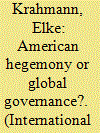

|
|
|
| 2 |
ID:
101748
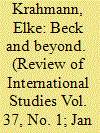

|
|
|
|
|
| Publication |
2011.
|
| Summary/Abstract |
Expanding on the works of Beck and others on the growing business of risk, this article examines the role of the private security industry in the creation, management and perpetuation of the world risk society. It observes that the replacement of the concept of security with risk over the past decades has permitted private firms to identify a growing range of unknown and unknown-unknown dangers which cannot be eliminated, but require permanent risk management. Using the discourse of risk and its strategies of commercialised, individualised and reactive risk management, the private risk industry thus has contributed to the rise of a world risk society in which the demand for security can never be satisfied and guarantees continuous profits.
|
|
|
|
|
|
|
|
|
|
|
|
|
|
|
|
| 3 |
ID:
145677
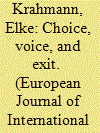

|
|
|
|
|
| Summary/Abstract |
Promoting Private Security Company (PSC) self-regulation has become a key focus due to high profile scandals during the military interventions in Iraq and Afghanistan. Related efforts include the Montreux Document, the International Code of Conduct for Private Security Service Providers (ICoC), American National Standards Institute/ASIS certification, and the new International Standards Organization (ISO) Management System Standard for Private Security Operations. Implicit in industry self-regulation, however, is the assumption that the consumers of private security services will help facilitate and enforce professional standards by shifting their custom to PSCs which have signed up to these codes of conduct or certification schemes. This article investigates the validity of this assumption with regard to government contracting. To what degree are public agencies able – and willing – to let professional standards guide their contracting behaviour? To answer this question, this article develops a general framework for the analysis of public consumer influence through choice, voice, and exit which draws on insights from microeconomics and Albert Hirschman’s classical treatise Exit, Voice, Loyalty. Taking the United States government as an illustrative example, the analysis observes several obstacles to encouraging security industry self-regulation through consumer power.
|
|
|
|
|
|
|
|
|
|
|
|
|
|
|
|
| 4 |
ID:
170284
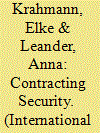

|
|
|
|
|
| Summary/Abstract |
Private military and security companies (PMSCs) are increasingly contracted to provide security in international peacekeeping missions. Yet, we know very little about the practical implications of this development. How do PMSCs reinforce and shape security management within UN peacekeeping operations, and what are the consequences for UN missions and their host populations? To answer these questions, we explore the operational, representative and regulatory security practices in the UN operation in the Democratic Republic of Congo (MONUSCO). Our findings show how seemingly uncontroversial, even benign security practices can have unintended negative consequences. Specifically, we observe that the participation of security firms in MONUSCO's security management contributes to three developments: the differentiation of security between staff and locals, the hardening of MONUSCO's security posture, and the perpetuation of insecurity through the emergence of a local security economy. Contracted security is thus involved in reproducing forms of security that are in some ways diametrically opposed to the aims of the mission to protect civilians and facilitate a sustainable peace.
|
|
|
|
|
|
|
|
|
|
|
|
|
|
|
|
| 5 |
ID:
177753
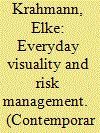

|
|
|
|
|
| Summary/Abstract |
Visuality is a central aspect of everyday security governance. In the recent visual turn in International Relations, however, the more mundane and routine visualities of security have been widely neglected. To address this gap, this article proposes a framework for analyzing the messages of security and risk conveyed by different modes of visual representations, ranging from press photos and educational images to outwardly appearances. Taking the United Nations Organization Stabilization Mission in the Democratic Republic of the Congo (MONUSCO) as an example, it shows that everyday visual representations reflect and contribute to security risk management in four ways: (1) They assist in the construction of self and other identities with regard to security, (2) they help to identify potential vulnerabilities, (3) they are used to educate people how to detect, assess, and behave in risky situations, and (4) they are employed to deter violent attacks.
|
|
|
|
|
|
|
|
|
|
|
|
|
|
|
|
| 6 |
ID:
110916
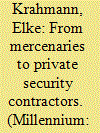

|
|
|
|
|
| Publication |
2012.
|
| Summary/Abstract |
The proliferation of armed security contractors in Iraq and Afghanistan has led to widespread criticism of their insufficient control through international laws and conventions. This article suggests that one reason for this omission has been the (re)construction of actors who provide armed force for profit in international legal discourses. During most of the 20th century, armed persons who participated in foreign conflicts for monetary gain were identified as 'mercenaries'. They were outlawed through international legal documents such as the United Nations (UN) Convention on Mercenarism and given restricted rights in the First Additional Protocol to the Geneva Conventions. Today, the same types of actors are increasingly defined as 'private security contractors', and new discourses and international agreements are emerging that attribute to them legality and legitimacy. The aim of this article is to examine the changing legal constructions of armed security providers since the 1970s and the consequences with respect to their control. The article argues that the (re)construction of actors who supply armed force for money in international legal discourses has been made possible by three main discursive strategies: the distinction between persons and corporations providing armed force for profit, the changing focus from the motivations of these actors to their relationship to a 'responsible command', and the shift from a concern about the actors to one about certain activities.
|
|
|
|
|
|
|
|
|
|
|
|
|
|
|
|
| 7 |
ID:
157103
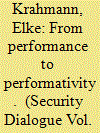

|
|
|
|
|
| Summary/Abstract |
Discussions about the legitimacy of private security companies (PSCs) in multilateral military interventions abound. This article looks at how the United States has sought to legitimize the outsourcing of security services to PSCs through performance-based contracting and performance assessments. Both mechanisms aim to demonstrate the effective provision of publicly desirable outcomes. However, the immaterial and socially constructed nature of security presents major problems for performance assessments in terms of observable and measurable outcomes. Performance has therefore given way to performativity – that is, the repetitive enactment of particular forms of behaviour and capabilities that are simply equated with security as an outcome. The implications of this development for the ways in which security has been conceptualized, implemented and experienced within US interventions have been profound. Ironically, the concern with performance has not encouraged PSCs to pay increased attention to their impacts on security environments and civilian populations, but has fostered a preoccupation with activities and measurable capabilities that can be easily assessed by government auditors.
|
|
|
|
|
|
|
|
|
|
|
|
|
|
|
|
| 8 |
ID:
120835
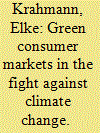

|
|
|
|
|
| Publication |
2013.
|
| Summary/Abstract |
Climate change has become one of the greatest threats to environmental security, as attested by the growing frequency of severe flooding and storms, extreme temperatures and droughts. Accordingly, the European Union's (EU) 6th Environment Action Programme (2010) lists tackling climate change as its first priority. A key aim of the EU has been to cut CO2 emissions, a major factor in climate change, by 8 per cent until 2012 and 20 per cent until 2020. The European Commission has proposed the encouragement of private consumer market for green products and services as one of several solutions to this problem. However, existing research suggests that the market share of these products has been only 3 per cent, although 30 per cent of individuals favour environmental and ethical goods. This article uses Public Goods Theory to explain why the contribution of the green consumer market to fighting climate change has been and possibly may remain limited without further public intervention.
|
|
|
|
|
|
|
|
|
|
|
|
|
|
|
|
| 9 |
ID:
160619
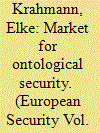

|
|
|
|
|
| Summary/Abstract |
Life in the European Union (EU) has never been as safe as it is today. Nevertheless, EU citizens express widespread anxiety about new risks, such as internal and external migration, transnational crime and terrorism, economic and fiscal uncertainty. One actor which has profited from this development is the security industry. Across Europe there are now nearly as many private security guards employed as public police forces. This article draws on the concept of ontological security to understand the discrepancy between safety and anxiety which underpins the expansion of private security services in Europe. It argues that Private Security Companies (PSCs) are involved in the construction and provision of ontological security through three mechanisms: risk identification, risk profiling and risk management. These mechanisms not only offer physical security, they also reduce existential anxieties by contributing to stable self-identities through personalised risk profiles, commodified lifestyle choices and security routines. Nevertheless, the effects are not only positive. In addition to individualisation and the responsibilization of European citizens for their own physical and ontological security these mechanisms increase societal reliance on commercial expert systems, while reinforcing the perceived failure of the EU as a political and collective security community.
|
|
|
|
|
|
|
|
|
|
|
|
|
|
|
|
| 10 |
ID:
148469
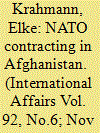

|
|
|
|
|
| Summary/Abstract |
Private military and security companies (PMSCs) play a growing role in international military and peacekeeping operations. Very little is known, however, about the fact that not only the United States relies extensively on contractors, but so do international organizations such as the North Atlantic Treaty Organization (NATO). This article examines NATO's collaboration with PMSCs during its leadership of the International Security Assistance Force in Afghanistan (ISAF, 2001–2014). It argues that NATO's use of international prime contractors and holding PMSCs responsible for their own security contributed to the creation of a complex network of contractors and subcontractors with detrimental effects for control and accountability. In particular, this article focuses on the proliferation of local Armed Private Security Companies (APSCs) which were accused of a wide range of humanitarian and human rights abuses. Drawing on principal–agent theory, this article seeks to explain why NATO appeared unable to stop the ‘culture of impunity’ among these firms. It shows that multiple principals and long principal–agent chains undermined NATO oversight over armed security guards. In addition, some principals and agents avoided accountability for APSC misconduct through three strategies: blame-shifting, back-scratching and morphing. NATO contracting practices, thus, had serious negative implications for the security of the civilian population and the ability of ISAF to establish lasting peace in Afghanistan.
|
|
|
|
|
|
|
|
|
|
|
|
|
|
|
|
| 11 |
ID:
060005
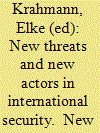

|
|
|
|
|
| Publication |
New York, Palgrave Macmillan, 2005.
|
| Description |
xii, 230p.
|
| Standard Number |
1403966974
|
|
|
|
|
|
|
|
|
|
|
|
Copies: C:1/I:0,R:0,Q:0
Circulation
| Accession# | Call# | Current Location | Status | Policy | Location |
| 049350 | 355.033/KRA 049350 | Main | On Shelf | General | |
|
|
|
|
| 12 |
ID:
095519
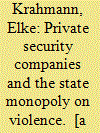

|
|
|
|
|
| Publication |
Frankfurt, PEace Research Institute, 2009.
|
| Description |
34p.
|
| Series |
PRIF report no. 88
|
| Standard Number |
9783937829890, pbk
|
|
|
|
|
|
|
|
|
|
|
|
Copies: C:1/I:0,R:0,Q:0
Circulation
| Accession# | Call# | Current Location | Status | Policy | Location |
| 054946 | 363.289/KRA 054946 | Main | On Shelf | General | |
|
|
|
|
| 13 |
ID:
062635
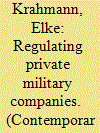

|
|
|
| 14 |
ID:
083740
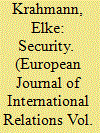

|
|
|
|
|
| Publication |
2008.
|
| Summary/Abstract |
The state monopoly on the legitimate use of violence in Europe and North America has been central to the development of security as a collective good. Not only has it institutionalized the state as the prime national and international security provider, it has helped to reduce the threat from other actors by either prohibiting or limiting their use of violence. The recent growth of the private security industry appears to undermine this view. Not only are private security firms proliferating at the national level; private military companies are also taking over an increasing range of military functions in both national defence and international interventions. This article seeks to provide an examination of the theoretical and practical implications of the shift from states to markets in the provision of security. Specifically, it discusses how the conceptualization of security as a commodity rather than a collective good affects the meaning and implementation of security in Western democracies.
|
|
|
|
|
|
|
|
|
|
|
|
|
|
|
|
| 15 |
ID:
061768
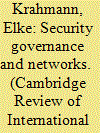

|
|
|
|
|
| Publication |
2005.
|
| Summary/Abstract |
The end of the Cold War has not only witnessed the rise of new transnational threats such as terrorism, crime, proliferation and civil war; it has also seen the growing role of non-state actors in the provision of security in Europe and North America. Two concepts in particular have been used to describe these transformations: security governance and networks. However, the differences and potential theoretical utility of these two concepts for the study of contemporary security have so far been under-examined. This article seeks to address this gap. It proposes that security governance can help to explain the transformation of Cold War security structures, whereas network analysis is particularly useful for understanding the relations and interactions between public and private actors in the making and implementation of national and international security policies.
|
|
|
|
|
|
|
|
|
|
|
|
|
|
|
|
| 16 |
ID:
120088
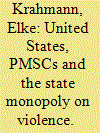

|
|
|
|
|
| Publication |
2013.
|
| Summary/Abstract |
The proliferation of private military and security companies (PMSCs) in Iraq and Afghanistan has raised many questions regarding the use of armed force by private contractors. This article addresses the question of whether the increased acceptance of PMSCs indicates a transformation of the international norm regarding the state monopoly on the legitimate use of armed force. Drawing on theoretical approaches to the analysis of norm change, the article employs four measures to investigate possible changes in the strength and meaning of this norm: modifications in state behaviour, state responses to norm violation, the promulgation of varying interpretations of the norm in national and international laws and regulations, and changes in norm discourse. Based on an analysis of empirical evidence from the United States of America and its allies, the article concludes that these measures suggest that the USA is leading the way towards a transformation of the international norm of the state monopoly on violence, involving a revised meaning. Although this understanding has not yet been formally implemented in international law, it has allowed a growing number of countries to tolerate, accept or legalize the use of armed force by PMSCs in the international arena.
|
|
|
|
|
|
|
|
|
|
|
|
|
|
|
|
|
|
|
|
|